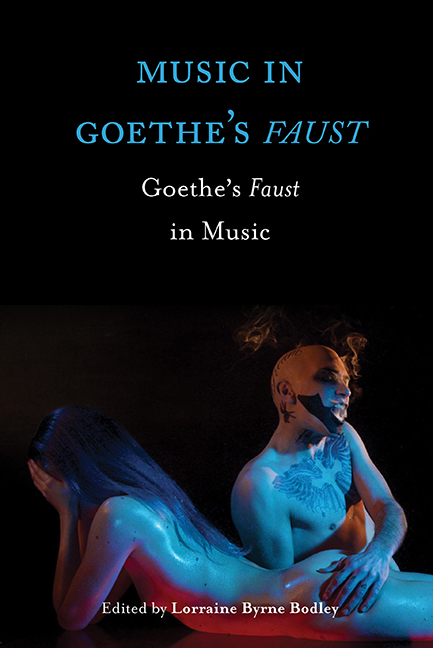Book contents
- Frontmatter
- Dedication
- Contents
- List of Illustrations
- Contributors
- Acknowledgements
- Abbreviations Used in the Notes
- Introduction. Rhapsody and Rebuke: Goethe's Faust in Music
- Part I Goethe's Faust: Content and Context
- Part II Legacies: Goethe's Faust in the Nineteenth Century
- Part III Topographies: Stagings and Critical Reception
- Part IV New Directions: Recent Productions and Appropriations
- 15 As Goethe Intended? Max Reinhardt's Faust Productions and the Aesthetics of Incidental Music in the Early Twentieth Century
- 16 Music and the Rebirth of Faust in the GDR
- 17 Music, Text and Stage: Peter Stein's Production of Goethe's Faust
- 18 ‘Devilishly good’: Rudolf Volz's Rock Opera Faust and ‘Event Culture’
- Select Bibliography
- Index
15 - As Goethe Intended? Max Reinhardt's Faust Productions and the Aesthetics of Incidental Music in the Early Twentieth Century
from Part IV - New Directions: Recent Productions and Appropriations
Published online by Cambridge University Press: 30 August 2017
- Frontmatter
- Dedication
- Contents
- List of Illustrations
- Contributors
- Acknowledgements
- Abbreviations Used in the Notes
- Introduction. Rhapsody and Rebuke: Goethe's Faust in Music
- Part I Goethe's Faust: Content and Context
- Part II Legacies: Goethe's Faust in the Nineteenth Century
- Part III Topographies: Stagings and Critical Reception
- Part IV New Directions: Recent Productions and Appropriations
- 15 As Goethe Intended? Max Reinhardt's Faust Productions and the Aesthetics of Incidental Music in the Early Twentieth Century
- 16 Music and the Rebirth of Faust in the GDR
- 17 Music, Text and Stage: Peter Stein's Production of Goethe's Faust
- 18 ‘Devilishly good’: Rudolf Volz's Rock Opera Faust and ‘Event Culture’
- Select Bibliography
- Index
Summary
It was to be Max Reinhardt's last theatre production in Europe: his production of Faust I at the Salzburg Festival was staged in 1937 for the fifth and last time, and its director found himself forced by the annexation of Austria to turn his back on Europe. Up to the present day this production is one of the milestones in the history of the Salzburg Festival. At its premiere in 1933 the accompanying music was given its own separate appraisal – something very unusual in the history of incidental music. The reviewer spoke of music ‘that came into the world in shackles’, by which he meant the tight and direct amalgamation of the acoustic dimension with the special Salzburg situation. What was seen and evaluated here first and foremost from marketing strategy angles (the impossibility of using the music again for productions elsewhere) can be applied also to the level of aesthetics concerning the work and its production: the linking of specially composed music to a specific performance context is indeed probably the most important characteristic of incidental music which distinguishes it fundamentally from opera.
Reinhardt's Salzburg Faust production with music by Bernhard Paumgartner is a significant example of a type of productive musical engagement with Faust which, until a few years ago, was completely ignored by both musicologists and Germanists and only recently emerged in the consciousness of at least those scholars who focus on theatre music: they see the history of Faust as a play for the stage, including the music for each production – and often exclusively for that production – as a primary and original strand of reception, which began in Goethe's lifetime, continued after his death and still has currency in the modern period and in the current theatre landscape. Early in the history of theatrical practice this kind of productive updating of the work by way of a new musical interpretation of Faust was often overlooked. On the one hand, in Goethe's lifetime there were no – or hardly any – performances of the work, so that it was received first of all as a reading drama.
- Type
- Chapter
- Information
- Music in Goethe's FaustGoethe's Faust in Music, pp. 245 - 261Publisher: Boydell & BrewerPrint publication year: 2017

